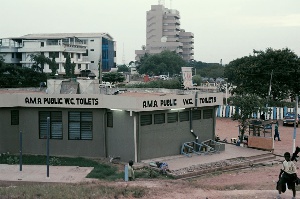Seven in 10 women in sub-Saharan Africa have no access to a safe toilet, threatening their health and exposing them to shame, fear and even violence.
This means that on World Toilet Day, which falls on November 19, some 297 million African women and girls lack safe and adequate sanitation and of those 107 million don’t have a toilet at all.
This is contained in a statement issued by WaterAid, an international NGO dedicated exclusively to the provision of safe domestic water, sanitation and hygiene education to the world’s poorest people, to mark World Toilet day.
It said a survey commissioned by WaterAid of women living across five slums in Lagos, Nigeria, showed that one in five had first or second hand experience of verbal harassment and intimidation, or had been threatened or physically assaulted in the last year when going to the toilet.
It said anecdotal evidence from other African countries suggested that the scale of the problem might be much larger than this.
Ms Barbara Frost, Chief Executive of WaterAid, said: “When women don’t have a safe, secure and private place to go to the toilet they are exposed and put in a vulnerable position and when they relieve themselves in the open they risk harassment.
Women are reluctant to talk about it or complain, but the world cannot continue to ignore this.
“Adequate sanitation, coupled with access to clean, safe water to drink, transforms lives, improving health, safety and productivity. Governments are urged to take action and invest in access to sanitation and water.”
The statement said other studies from Uganda and Kenya showed that such experiences of fear, indignity and violence appeared to be common in Africa wherever women lacked access to safe and adequate sanitation.
It quoted Sandimhia Renato, 18, from Mozambique as saying she walks 15 minutes every day to defecate in the bush. Renato said: “Sometimes when I go I feel ashamed and go back without defecating. Sometimes I wait until dark to go there so no one can see me.
I will be very concerned about Diani, my daughter, going to the bush because it is so far from here.
“At night it is very dangerous. People get killed. A woman and a boy were killed with knives. One woman I know of has been raped.” WaterAid said security came out as a recurring concern in the poll of women from slums in Lagos, with 67% of respondents saying they felt unsafe even using shared or community toilets in a public place.
It said poor hygiene had serious implications on health. “Every day, over 1,000 African mothers lose a child to diarrhoeal diseases caused by a lack of adequate sanitation and clean water. Lack of decent sanitation also affects productivity and livelihoods.
“Women and girls living in sub-Saharan Africa without toilet facilities spend 20 billion hours each year finding a place to go in the open,” WaterAid said. Ms Frost said: “This World Toilet Day, WaterAid is joining the call of hundreds of organisations around the world, for governments to keep the promises they have made to get adequate sanitation and safe water to the world’s poorest people.”
Regional News of Monday, 19 November 2012
Source: GNA

















